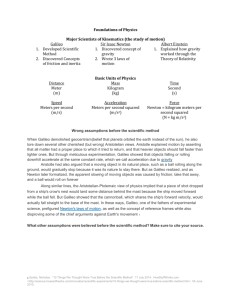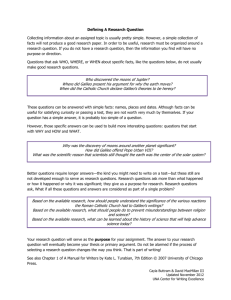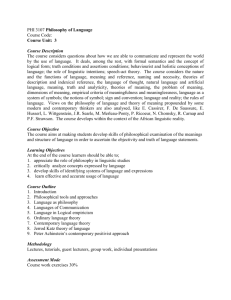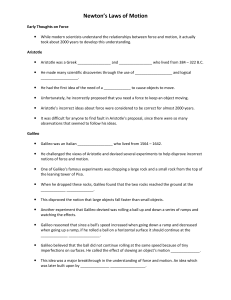Eino Kaila, Human Knowledge: A Classic Statement of Logical
advertisement
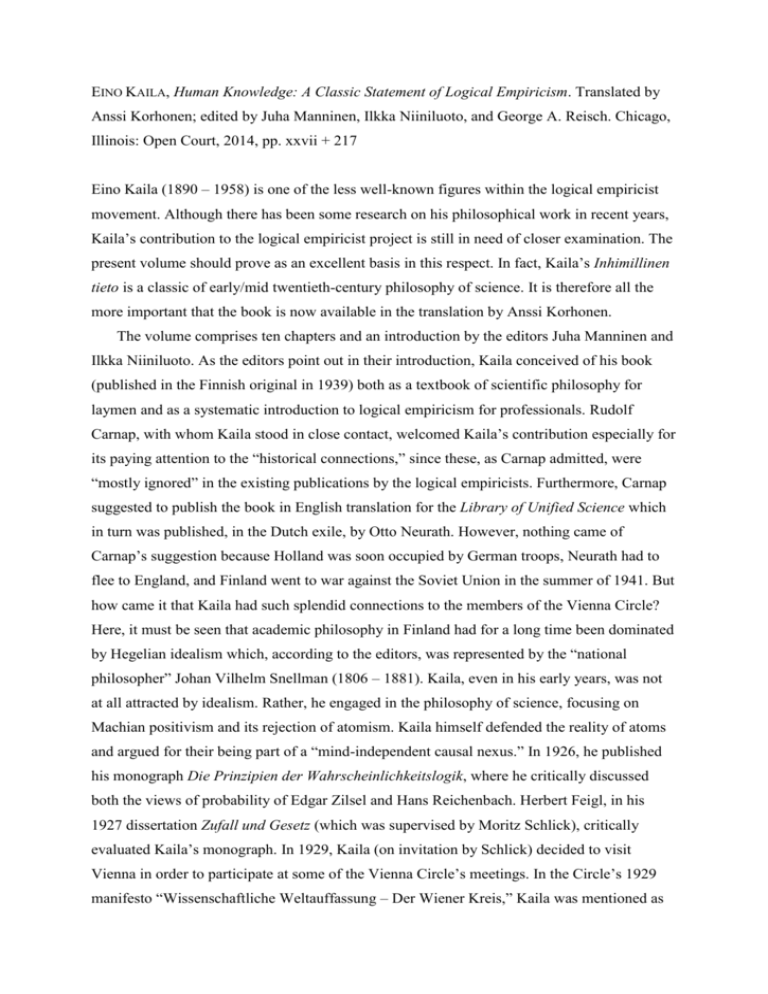
EINO KAILA, Human Knowledge: A Classic Statement of Logical Empiricism. Translated by Anssi Korhonen; edited by Juha Manninen, Ilkka Niiniluoto, and George A. Reisch. Chicago, Illinois: Open Court, 2014, pp. xxvii + 217 Eino Kaila (1890 – 1958) is one of the less well-known figures within the logical empiricist movement. Although there has been some research on his philosophical work in recent years, Kaila’s contribution to the logical empiricist project is still in need of closer examination. The present volume should prove as an excellent basis in this respect. In fact, Kaila’s Inhimillinen tieto is a classic of early/mid twentieth-century philosophy of science. It is therefore all the more important that the book is now available in the translation by Anssi Korhonen. The volume comprises ten chapters and an introduction by the editors Juha Manninen and Ilkka Niiniluoto. As the editors point out in their introduction, Kaila conceived of his book (published in the Finnish original in 1939) both as a textbook of scientific philosophy for laymen and as a systematic introduction to logical empiricism for professionals. Rudolf Carnap, with whom Kaila stood in close contact, welcomed Kaila’s contribution especially for its paying attention to the “historical connections,” since these, as Carnap admitted, were “mostly ignored” in the existing publications by the logical empiricists. Furthermore, Carnap suggested to publish the book in English translation for the Library of Unified Science which in turn was published, in the Dutch exile, by Otto Neurath. However, nothing came of Carnap’s suggestion because Holland was soon occupied by German troops, Neurath had to flee to England, and Finland went to war against the Soviet Union in the summer of 1941. But how came it that Kaila had such splendid connections to the members of the Vienna Circle? Here, it must be seen that academic philosophy in Finland had for a long time been dominated by Hegelian idealism which, according to the editors, was represented by the “national philosopher” Johan Vilhelm Snellman (1806 – 1881). Kaila, even in his early years, was not at all attracted by idealism. Rather, he engaged in the philosophy of science, focusing on Machian positivism and its rejection of atomism. Kaila himself defended the reality of atoms and argued for their being part of a “mind-independent causal nexus.” In 1926, he published his monograph Die Prinzipien der Wahrscheinlichkeitslogik, where he critically discussed both the views of probability of Edgar Zilsel and Hans Reichenbach. Herbert Feigl, in his 1927 dissertation Zufall und Gesetz (which was supervised by Moritz Schlick), critically evaluated Kaila’s monograph. In 1929, Kaila (on invitation by Schlick) decided to visit Vienna in order to participate at some of the Vienna Circle’s meetings. In the Circle’s 1929 manifesto “Wissenschaftliche Weltauffassung – Der Wiener Kreis,” Kaila was mentioned as one of the thinkers close to the “scientific world-conception” of the Circle. This had to do in the first place with Kaila’s methodological orientation which implied that there is no sharp difference between philosophy and special scientific disciplines and that philosophy itself should proceed by making use of exact methods. However, as concerns questions of systematic outlook, Kaila, like Reichenbach, defended some sort of probabilistic realism, particularly against Carnap’s declaration that the realism controversy is meaningless. This brings us to the book’s ten chapters which are tied together by one red thread, namely (the unifying idea of) invariance. More precisely, the book is subdivided in three parts. Part One deals with the problem of theory formation, Part Two with the formal truth of theories, and Part Three with the empirical truth of theories. Invariance plays an essential role in all three parts. However, it is especially Part One where Kaila develops his invariantist approach to science and scientific theory construction. As he declares in the preface, for him “the logical empiricist conception of knowledge is the culmination of two and a half millennia of development in human ideas” (xxvi). Yet, it must be seen that Kaila, by invoking invariance, contributed an own and very specific version of the logical empiricist conception of knowledge. Heavily inspired by Ernst Cassirer’s Substanzbegriff und Funktionsbegriff (1910), Kaila characterized the aim of science as the “search for invariances” (3). By ‘invariance’ he meant something like regularity, or lawfulness; but he also meant by it the stability, or constancy, of physical entities like energy. On the whole, it is invariances which, according to Kaila, are the object of both scientific and prescientific knowledge. Or, as he puts it at the beginning of chapter 1: “As the invariances that we discover are more general, the more we succeed in satisfying our pursuit of knowledge.” (ibid.) Thus there is a hierarchy of invariant systems ranging from everyday perceptual objects to the most stable and lawful objects of science. The outstanding characteristic of the objects of science is that they are idealized. According to Kaila, in science “we round off everything in thought” (10), that is, we “rationalize our concepts – for instance the concept of acceleration – to give them that exactness, precision, and simplicity that is not possessed by the corresponding phenomena of experience” (ibid.). Nevertheless, the search for invariances leads, according to Kaila, to substantive knowledge. Although it is not perceptual qualities which are grasped by scientific knowledge, we are in position to acquire knowledge of certain structural features which, in mathematized science, usually have the status of isomorphisms. It is for this reason that Kaila thinks that “it is wrong to say that we know nothing of things-in-themselves; after all we know their structure” (14). Chapters 2, 3 and 4 reconstruct the historical development from the Greeks up to Galileo, Newton, and Leibniz. For Kaila, Galileo is the hero of this story. For it was Galileo who brought together the two decisive components of scientific knowledge: the search for invariances, on the one hand, and the requirement of verification, on the other. Whereas Aristotle raised the question ‘What?’ and accordingly looked for the substance, or essence, of things, Galileo raised the question ‘How?’ and accordingly looked for functions, or as Kaila alternatively puts it, “relational invariances” (51). Questions about essences were completely ignored by Galileo, which in turn, in Kaila’s eyes, makes him “one of the forerunners of logical empiricism” (53). However, with Descartes, the empiricist impetus was rudely stopped: “This distinguished mathematician, despite being given the honorific title ‘father of modern philosophy’, was far behind Galileo in his conception of knowledge. In Galileo we find a fruitful balance between the search for invariances and the requirement of empirical verifiability. But with Descartes this balance tilts toward Plato and a postulate of invariance. Empirical verifiability, it is suggested, is not necessary in principle, for we are supposed to know the laws of nature in advance.” (59) Unlike Galileo, Descartes, by raising the question ‘Why,’ was looking for ‘ultimate causes’ and thereby stepping back to Aristotelian essentialism. But then, Kaila rather dramatically declares, the “gigantic figure of Newton” (61) entered the stage. With Newton, the Galilean conception of knowledge got saved, that is, according to Kaila “Newton redirects the course of modern science, rescuing it at a moment when Cartesianism was leading it away from the right path” (61). By rejecting a priori speculative hypotheses about the essences of phenomena and their causes, Newton returned to the empirical basis of science. As early as in his New Theory of Light and Colours of 1671, Newton refused to answer Aristotelian and Cartesian what- or why-questions: “Science has no other task than to start from experience and state the exact laws of phenomena that will help other phenomena to be predicted. That famous slogan, ‘Hypotheses non fingo,’ is already presupposed in this first work.” (62) With Leibniz, this whole development reaches its culmination. For, according to Kaila, it was Leibniz who, in terms of his “principe de l’observabilité, most forcefully articulated the requirement of empirical verifiability. Thus, like Galileo and Newton, Leibniz – the alleged “radical rationalist” (67) – should be seen as a forerunner of the modern, i. e. logical empiricist, conception of knowledge. Chapter 5 closes Part One by reflecting on the problem of induction and its relation to the concept of probability. As Kaila briefly indicates, the task of an ‘inductive logic’ in his view is illusory. For him, the probability that we assign to inductive generalizations is purely psychological. It has to do exclusively with the “way of discovery” (82), whereas logic is restricted to the “way of demonstration” (ibid.). Accordingly, an inductive logic would be a contradictio in adiecto. Part Two of the book is subdivided in two chapters. Chapter 6 deals with logical truth, chapter 7 with mathematical truth. As concerns logical truth, Kaila gives an instructive and very readable overview over the basic elements of modern first-order logic. He thereby draws on results provided by David Hilbert, Bertrand Russell, Ludwig Wittgenstein, and Alfred Tarski. Furthermore, he addresses Kurt Gödel’s work on the so-called decision problem and finally concludes that logical truths are “consequences of definitions” (120) and are therefore to be seen as analytical sentences. Interestingly enough, Kaila in this context anticipates certain ideas by W. V. O. Quine, claiming that “the analyticity and syntheticity of a sentence is a ‘relative matter’ that depends on how certain concepts have been defined” (116). As concerns mathematical truth, Kaila, at the end of chapter 7, introduces what he calls “the first main thesis of logical empiricism” (136). What this thesis says is that the metalogical statements ‘Statement L is analytic’ and ‘Statement L is a priori’ are equivalent. The socalled second main thesis of logical empiricism says that every statement concerning reality must have real content. This in turn comes very close to what Carnap (in his “Testability and Meaning”) called the Principle of Testability. Kaila concludes Part Two by claiming that “Kant’s basic question, ‘How are synthetic a priori statements possible?’ is a mistake because there are no such statements.” (140) On Kaila’s own account only analytic statements are a priori and vice versa. Synthetic statements, on the other hand, are a posteriori, i.e., dependent exclusively on experience. Part Three, which deals with empirical truth, is focused on such synthetic statements. At its very beginning, in chapter 8, Kaila introduces the so-called third main thesis of logical empiricism, namely the Principle of Translatability which says that every theory (or set of theoretical statements) must be translatable into the language of experience. However, Kaila qualifies this principle by conceding that not every factual statement must be capable of a definitive verification (or falsification). He thereby criticizes the “radical positivist” (147) positions of Ludwig Wittgenstein and (especially) Moritz Schlick who, in his view, required that every factual statement be translatable to statements concerning ‘the given.’ Yet, in the further development of logical empiricism this radical view became liberalized by the weaker requirement of testability. As Kaila further points out, there is no empirical statement which is immune against revision. On the other hand, he goes not so far as to defend some sort of ‘coherence theory of knowledge,’ albeit “some extremists among the logical empiricists” (156), especially Otto Neurath, argued in favor of such a theory. On the whole, it remains somewhat unclear what Kaila’s own position in this context amounts to. The best guess seems to be that he intends to defend some sort of Duhemian ‘holism,’ as regards the relation of theory and experience. At any rate, Kaila explicitly states that “[w]e must […] give the principle of testability a broad interpretation, so that a theory in its entirety can be regarded as ‘one sentence’” (170). Furthermore, Kaila rejects all forms of metaphysics, understanding by ‘metaphysical’ a sentence which is intended as a factual sentence but does not have any experiential consequences. He directly criticizes Heidegger’s “essentialism” and “existentialism” and banishes it (in an overtly Carnapian manner) from the area of philosophy as “something like a lyrical outburst” (173). Chapter 9 deals with the “logic of physical theories.” It contains an interesting interpretation – and justification – of “micro-physical” theories. In Kaila’s view, “a sentence of a physical theory cannot be ruled out as ‘metaphysics’ solely on the grounds that it fails to depict any specific phenomenon of experience” (195). Rather, “[f]rom a logical point of view, there is nothing wrong with developing a micro-physical theory as far beyond the ‘threshold of observation’ as one may wish, in which case the theory will of necessity contain many sentences that cannot be tested in experience, as long as they are considered in themselves” (ibid.). Again, Duhemian holism, drives Kaila’s argumentation, thus anticipating Quine anew. The concluding Chapter 10 is devoted to what Kaila calls “logical behaviorism.” By ‘logical behaviorism’ he means the articulation of the following, so-called fourth main thesis of logical empiricism: Sentences about a subject’s immediate experience are equivalent to certain sentences about the states in the subject’s body. Simply put, Kaila in this connection recapitulates Carnap’s conception of the notorious mind-body problem. His position seems to be that of a ‘moderate physicalist.’ However, how the questions pertaining to the mind-body problem are to be answered is, according to Kaila, “for future experience to decide” (205). Given the increasing interest in Kaila’s variant of logical empiricism, the present volume is a valuable source for scholars interested in the history of philosophy of science. Moreover, Human Knowledge deserves to be recommended to those who want to get a systematic overview over the principal tenets, claims and arguments of the logical empiricist project. Matthias Neuber (Tübingen)


